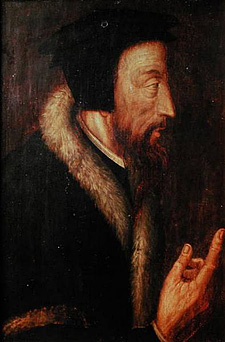In some respects, Calvin is a controversial historical figure. Many regard him as having been an austere man. Others criticize him for his role in what happened to Michael Servetus. If memory serves me correctly, historian Will Durant went as far as to claim Calvin was a monster and ran Geneva like a sort of police state. Even among Christians, some have exclaimed in disbelief “What love is this?” with regard to the theological system known as “Calvinism.”
 Others have had a much higher esteem for Calvin. B.B. Warfield believed Calvin deserved the title “the theologian of the Holy Spirit.” D. Martyn Lloyd-Jones once compared the Puritans to the Alps but Calvin (along with Luther) to the Himalayas (and Jonathan Edwards to Mt. Everest).
Others have had a much higher esteem for Calvin. B.B. Warfield believed Calvin deserved the title “the theologian of the Holy Spirit.” D. Martyn Lloyd-Jones once compared the Puritans to the Alps but Calvin (along with Luther) to the Himalayas (and Jonathan Edwards to Mt. Everest).
Speaking for myself, I think the negative charges are probably based on an overly simplistic and possibly even faulty understanding of the man and his beliefs, whereas the acclamations are at least somewhat overstated.
In any case, Bible-believing Christians don’t look to Calvin in the same way, for example, as Catholics look to the Pope or the Magisterium. Calvin was merely a man of his times, warts and all (which Calvin would have been the first to admit). He tried to serve God and God’s people as best as he could according to the light God gave him to understand and unfold the Holy Scriptures. Calvin himself prayed:
“I offer my heart to you, O Lord, eagerly and earnestly.”
Personally, I find reading Calvin wonderfully sweet. He lived in harsh times and suffered quite a bit in his life—probably more so than most of us in the West have or will ever suffer. Yet, by God’s grace, his hard life made his pen flow with such beautiful words. When I read his writings (in the context of such a polemical period of history), there’s a tremendous sense of humility and love which exudes from his writing, which draws me to worship and thank the Lord our God for what he did in and through such a servant.
Perhaps the following words will seem ‘too much’ as well, but I’m tempted to say, if Luther was the bright, blazing fire which ignited the Reformation, then Calvin was the still, deep waters which settled the Reformation. If Luther burned as hot as the sun in the fight for the truth of justification by faith alone in Christ alone, then Calvin was as profoundly reflective as the moon in his philosophical and theological systematizing of these same biblical truths. If Luther was like Elijah challenging Ahab and Jezebel, calling down fire from heaven, slaying the prophets of Baal, and riding into the heavens upon a chariot of fire, then Calvin was like Elisha quietly and graciously feeding the hungry with bread, curing Naaman the Syrian of leprosy, and restoring a poor woman’s only son to life again. Perhaps the difference between the two Reformers is accentuated in each of their most famous hymns: in Luther’s case the vigorous and stalwart A Mighty Fortress Is Our God, and in Calvin’s case the gentle and honeyed I Greet Thee Who My Sure Redeemer Art.























